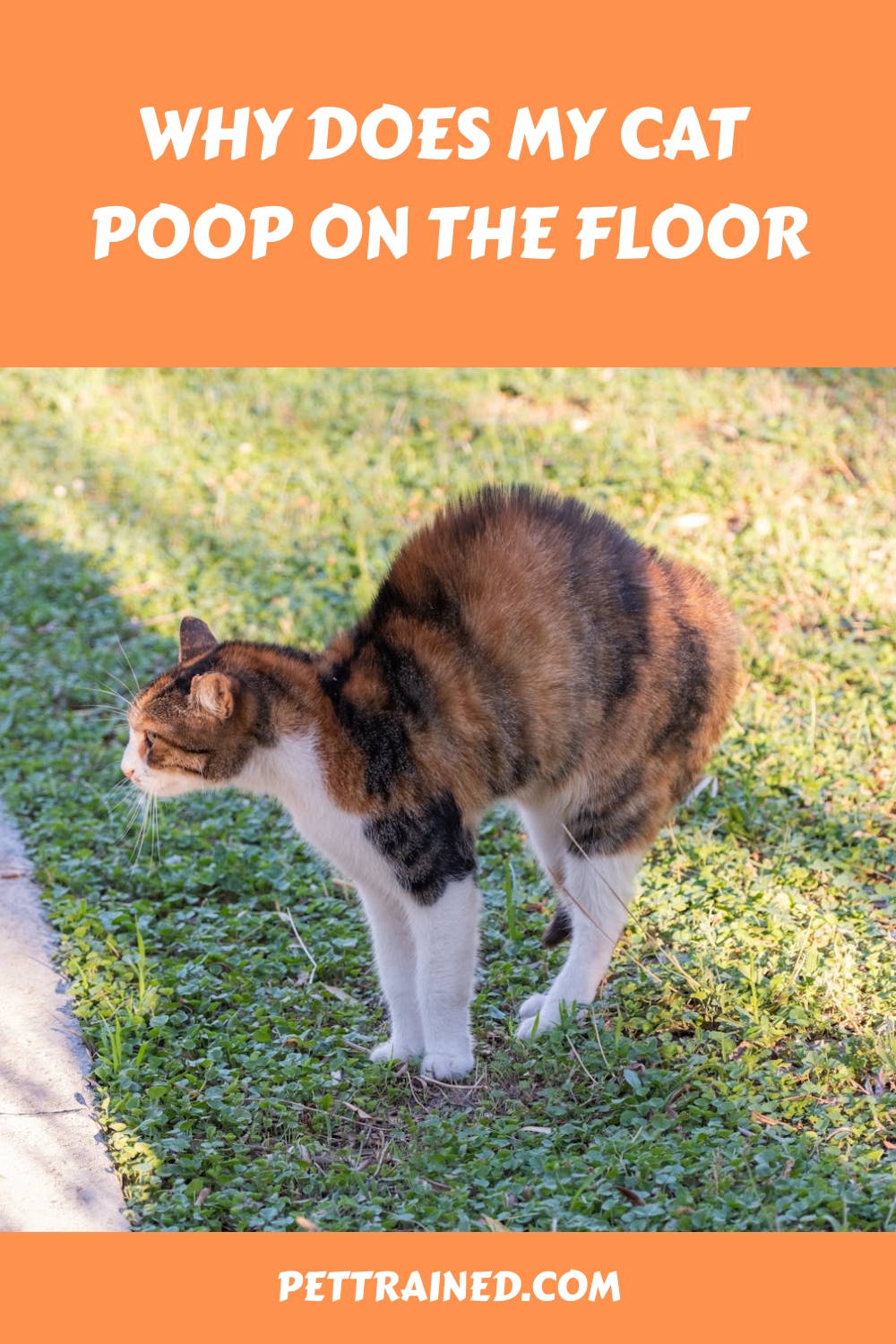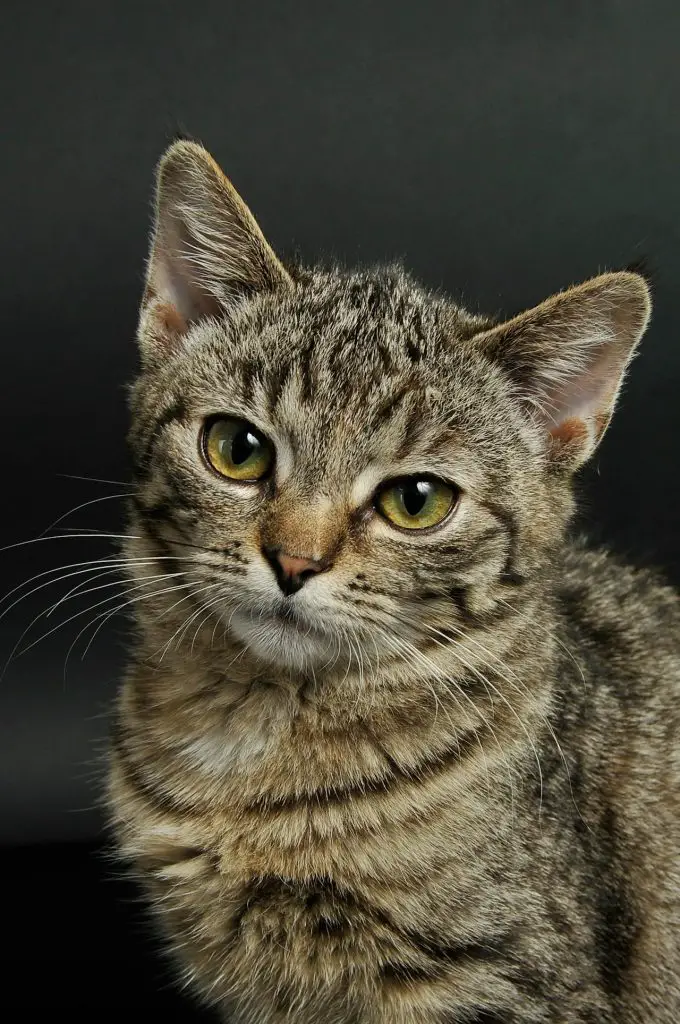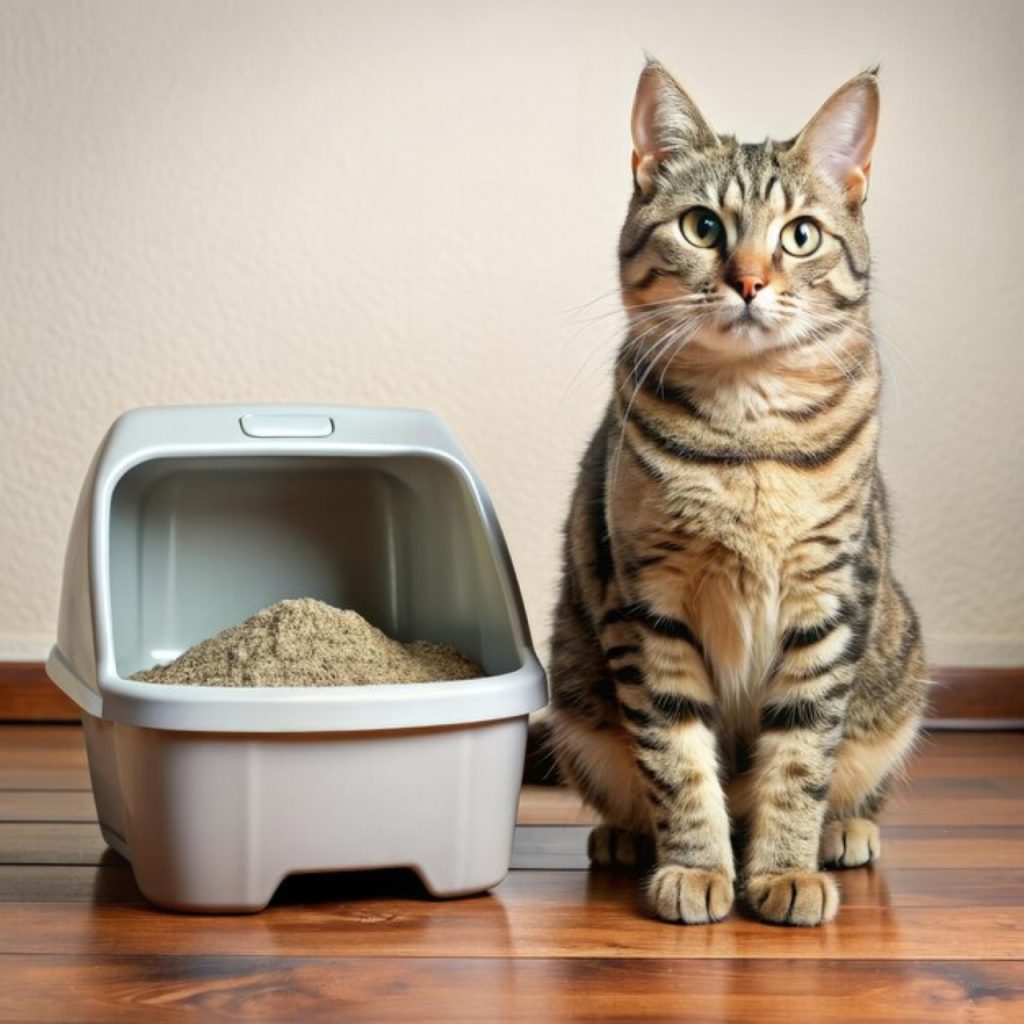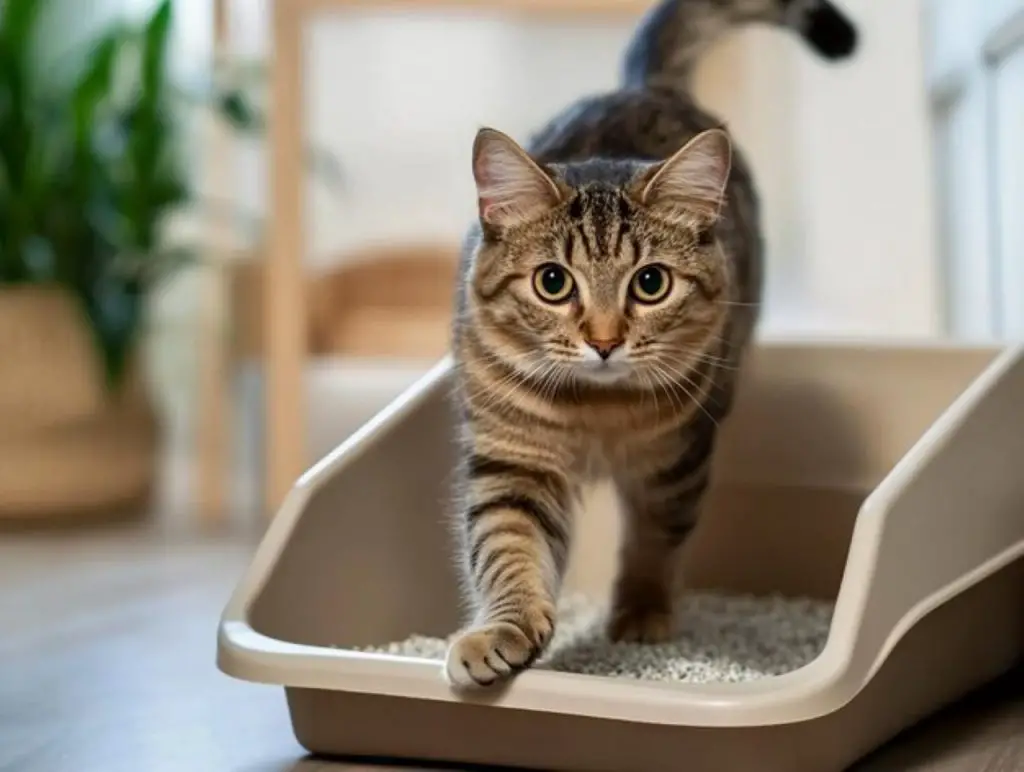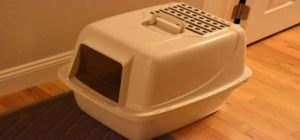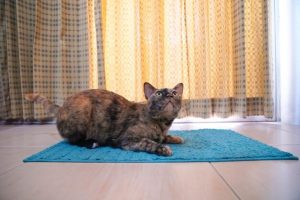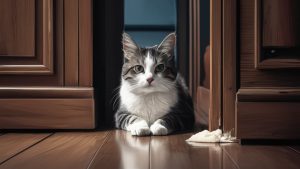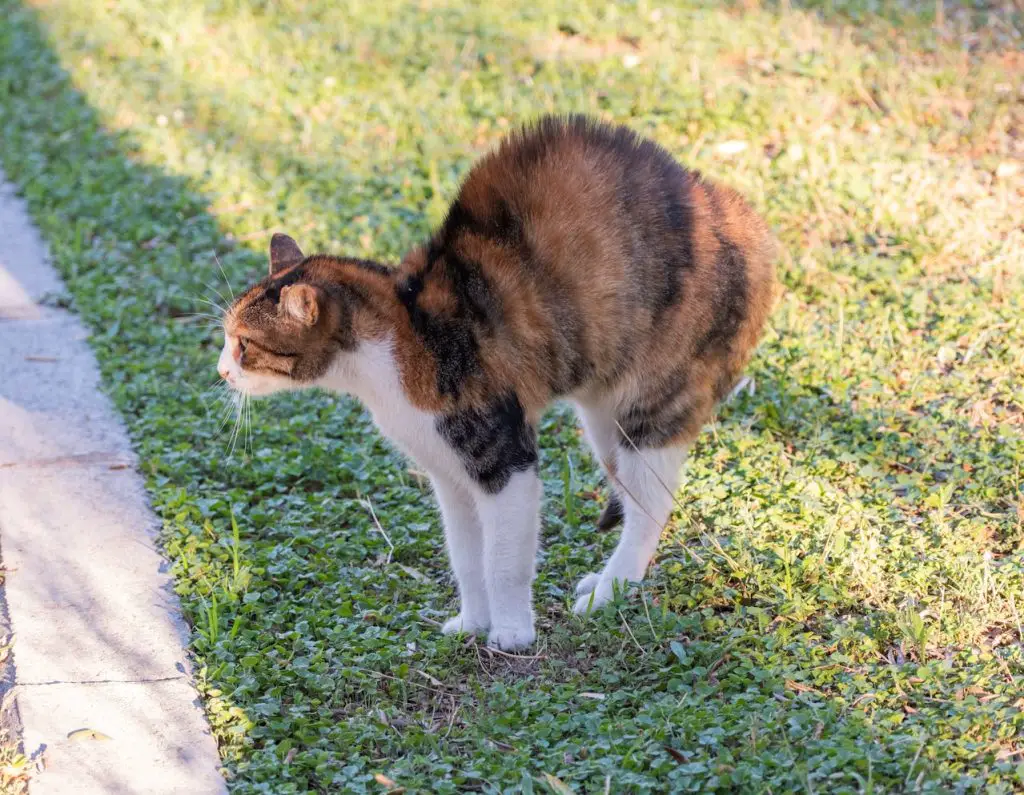
Your cat might be pooping on the floor due to various reasons. Medical issues like gastrointestinal disorders or urinary tract infections can cause discomfort, leading to accidents. Litter box problems, including poor location, cleanliness, or accessibility, can deter your cat from using it. Stress and anxiety from environmental changes or new pets may also trigger this behavior. Sometimes, cats use feces for territorial marking, especially in multi-cat households. It’s essential to rule out health issues first by consulting a veterinarian. Once medical causes are excluded, you can address potential environmental factors and litter box setup to help resolve the problem. Understanding the underlying cause is key to finding an effective solution.
Table of Contents
Key Takeaways
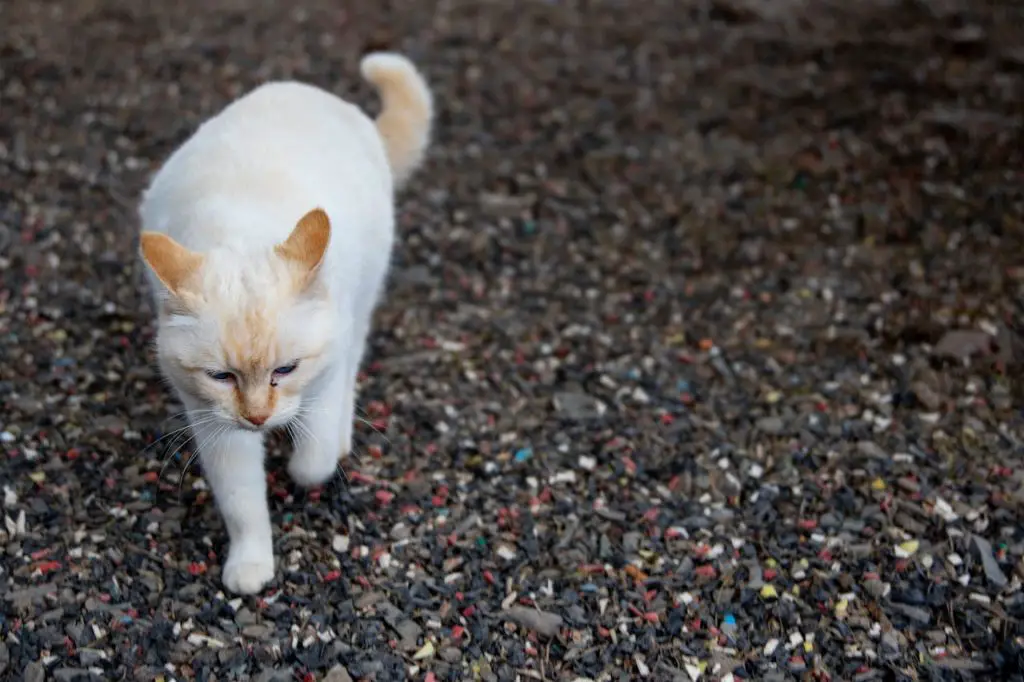
- Medical issues like gastrointestinal disorders or urinary tract infections can cause cats to defecate outside the litter box.
- Litter box problems, including poor location, insufficient cleanliness, or accessibility issues, may lead to inappropriate elimination.
- Stress and anxiety from environmental changes or new pets can trigger cats to poop on the floor.
- Territorial marking through feces can occur in multi-cat households or when cats feel their territory is threatened.
Medical Issues
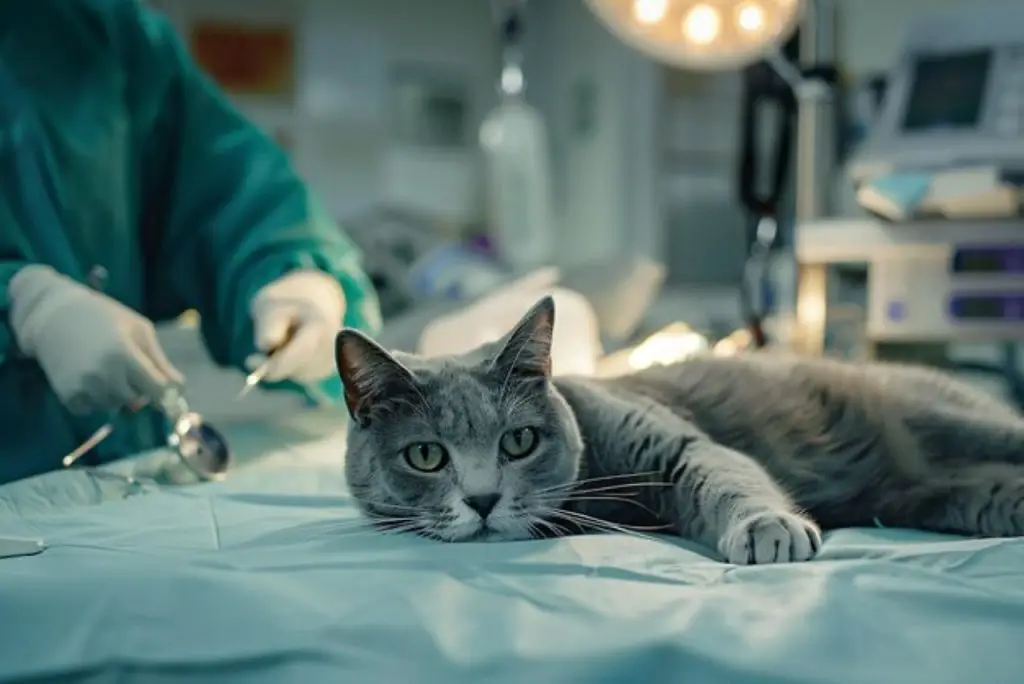
Underlying health conditions can often be the root cause of a cat’s inappropriate elimination behaviors. When your feline friend starts pooping on the floor instead of using their litter box, it’s vital to take into account potential medical issues.
Gastrointestinal disorders are a common culprit, as they can cause discomfort and urgency in your cat’s bowel movements. These disorders may include inflammatory bowel disease, food allergies, or parasitic infections.
Urinary tract infections, while primarily affecting urination, can also lead to changes in defecation habits. The pain and inflammation associated with these infections may cause your cat to avoid the litter box altogether.
Other medical conditions that could contribute to this behavior include arthritis, which may make it difficult for your cat to access the litter box, and cognitive dysfunction in older cats, which can lead to confusion about proper elimination locations.
This post contains affiliate links. However all the information provided on this site are my own honest opinions. See more in Disclaimer.
It’s essential to consult with your veterinarian if you notice any changes in your cat’s bathroom habits. They can perform a thorough examination and necessary tests to rule out or diagnose any underlying medical issues.
Prompt identification and treatment of these conditions can help resolve the problem and restore your cat’s normal litter box habits.
Litter Box Problems
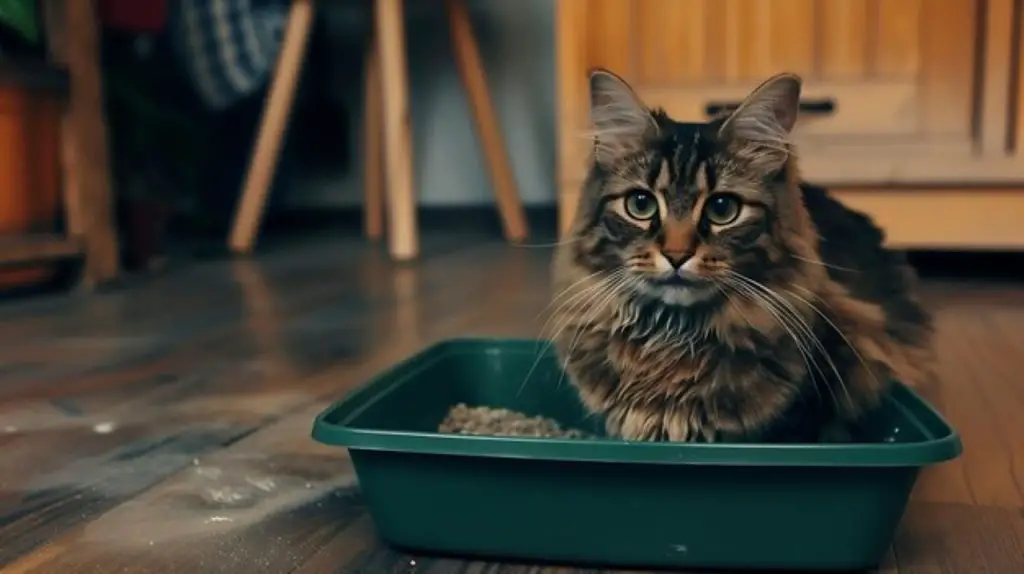
Your cat’s litter box issues can stem from its location and cleanliness.
If you’ve placed the box in a noisy or high-traffic area, your cat may feel too exposed or anxious to use it.
Additionally, cats are naturally clean animals, and a dirty or smelly litter box can deter them from using it, leading to accidents on your floor.
Unsuitable Litter Box Location
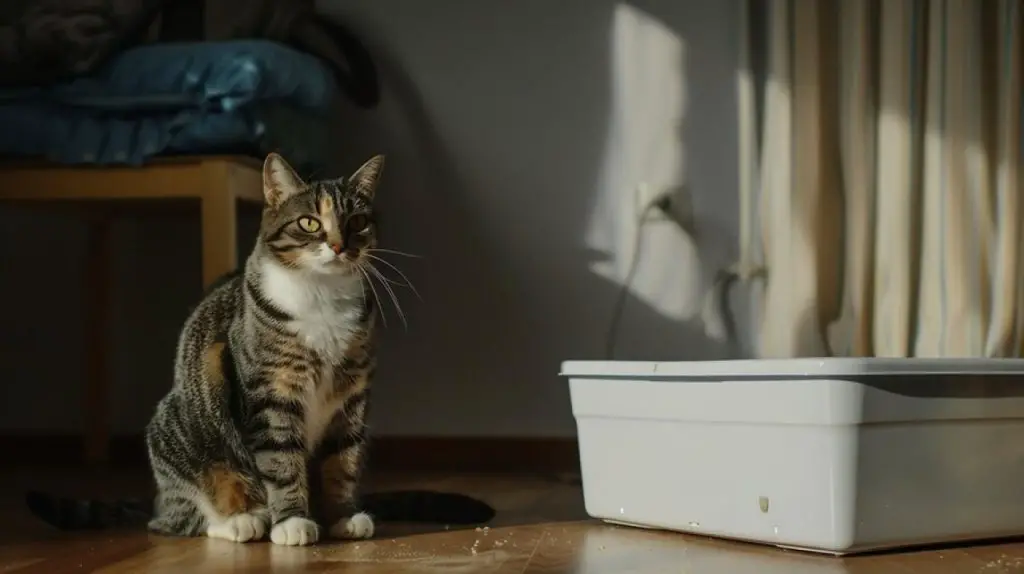
The location of your cat’s litter box can greatly impact their willingness to use it, often leading to accidents on the floor.
Litter box accessibility plays an essential role in cat behavior, and an unsuitable location may deter your feline friend from using it properly.
Consider factors such as privacy, quietness, and ease of access when choosing a spot for the litter box.
Avoid placing the litter box in high-traffic areas or near noisy appliances, as cats prefer to do their business in peace. Make sure the box isn’t tucked away in a hard-to-reach corner or blocked by furniture.
Your cat should have a clear path to their litter box at all times.
If you have a multi-story home, provide at least one litter box on each level to prevent your cat from having to travel far when nature calls.
Additionally, keep the litter box away from your cat’s food and water bowls. Cats naturally separate their elimination areas from their eating spaces.
Dirty or Unpleasant Litter
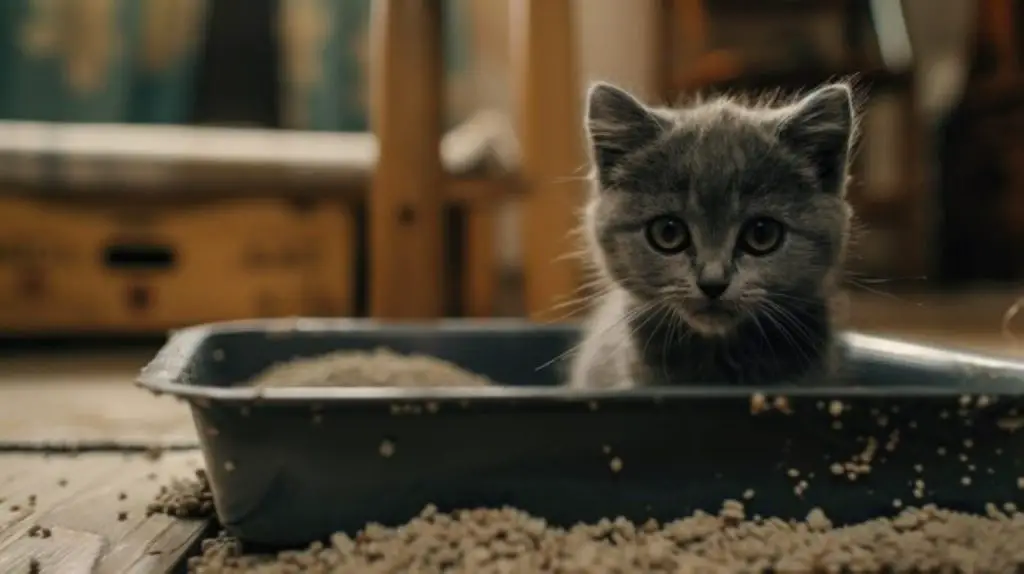
Cats are highly sensitive to the cleanliness and quality of their litter, often refusing to use a box that’s dirty or filled with unpleasant-smelling material.
Your feline’s litter preferences play an essential role in maintaining proper bathroom habits. Cats may avoid their litter box if it’s not cleaned regularly or if the litter type doesn’t meet their standards for comfort and odor control.
To guarantee your cat’s satisfaction, consider the following factors:
| Litter Type | Cleaning Frequency | Odor Control |
|---|---|---|
| Clumping | Daily scooping | Excellent |
| Non-clumping | 2-3 times per week | Good |
| Silica gel | Weekly | Very good |
| Pine | Every 2-3 days | Natural scent |
Choose a litter that aligns with your cat’s preferences and your cleaning routine. Some cats prefer fine-grained litter, while others may like larger pellets.
Experiment with different types to find the best fit. Additionally, maintain proper odor control by using litter with activated charcoal or other odor-absorbing properties.
Regularly clean the litter box with mild, unscented soap and replace it entirely every few weeks.
By maintaining a clean, pleasant litter environment, you’ll greatly reduce the likelihood of your cat choosing to eliminate elsewhere in your home.
Stress and Anxiety
Stress and anxiety can greatly impact a cat’s feline behavior, often leading to inappropriate elimination outside the litter box.
Anxiety triggers in cats can stem from various sources, including changes in their environment, new pets or people, or even alterations to their routine.
When your cat feels overwhelmed, they may seek alternative places to relieve themselves, perceiving these locations as safer or more comforting.
To better understand your cat’s stress-related pooping behavior, consider these potential anxiety triggers:
- Loud noises or construction in the home
- Introduction of a new pet or family member
- Moving to a new house
- Changes in your work schedule
Recognizing these factors is vital in addressing your cat’s inappropriate elimination. Cats are creatures of habit, and disruptions to their normal routine can cause significant distress.
If you suspect stress is causing your cat to poop on the floor, it’s important to identify and mitigate the source of anxiety. Providing a calm, stable environment and maintaining consistent routines can help alleviate your cat’s stress.
In some cases, consulting with a veterinarian or feline behaviorist may be necessary to develop a tailored plan to address your cat’s specific needs and reduce anxiety-related pooping incidents.
Territorial Marking

Territorial marking serves as another significant reason why your feline companion might choose to defecate outside the litter box.
Cats are instinctively driven to establish and maintain their territory, and one way they do this is through scent marking.
While urine spraying is a more common form of territorial marking, some cats may resort to defecating in prominent areas to assert their dominance.
This behavior is more likely to occur in multi-cat households or when there’s a perceived threat to your cat’s territory.
You might notice your cat leaving feces in visible locations, such as near doors or windows, especially if they’ve spotted outdoor cats. This dominance behavior is your cat’s way of communicating ‘This is my space’ to other animals.
It’s important to note that territorial marking through defecation isn’t as common as other forms of marking.
If your cat is exhibiting this behavior, it’s vital to address any underlying stressors and guarantee each cat in your household has sufficient resources and space.
Consulting with a veterinarian or feline behaviorist can help you develop strategies to mitigate this issue and restore proper litter box habits.
Cleanliness Concerns
Cleanliness issues can greatly contribute to your cat’s decision to defecate outside the litter box. A dirty litter box is often the primary culprit, as cats are fastidious creatures who may refuse to use an unclean toilet area.
Additionally, the location of the litter box itself can be problematic if it’s in a noisy, high-traffic area or too close to your cat’s food and water, potentially causing your feline to seek out alternative spots for elimination.
Dirty Litter Box
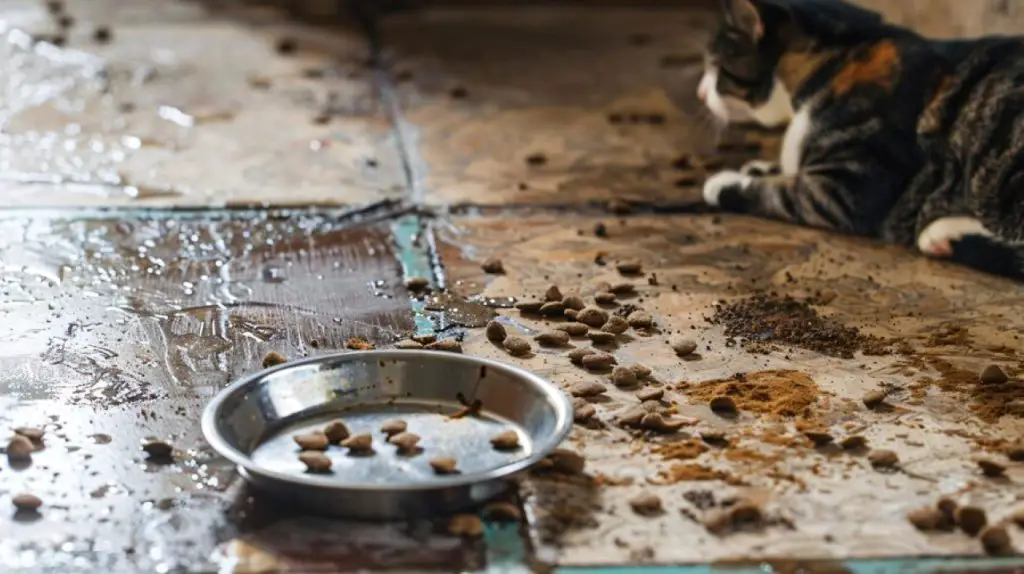
One of the most common reasons cats defecate outside their litter box is due to unsatisfactory hygiene conditions within it.
Proper litter box maintenance is vital for your feline friend’s comfort and health.
Cats are naturally clean animals, and they’ll avoid using a dirty litter box if given the choice.
To guarantee ideal litter box hygiene, consider the following:
- Scoop waste daily
- Completely change the litter weekly
- Clean the box with mild soap monthly
- Replace the entire box annually
When you neglect litter box maintenance, your cat may seek alternative places to relieve itself. This behavior isn’t out of spite; it’s a natural response to unsanitary conditions.
A dirty litter box can also pose health risks, potentially exposing your cat to harmful bacteria and parasites.
You’ll need to establish a consistent cleaning routine to prevent litter box avoidance. If you’re frequently away, consider investing in a self-cleaning litter box or hiring a pet sitter to maintain cleanliness.
Litter Box Location Issues
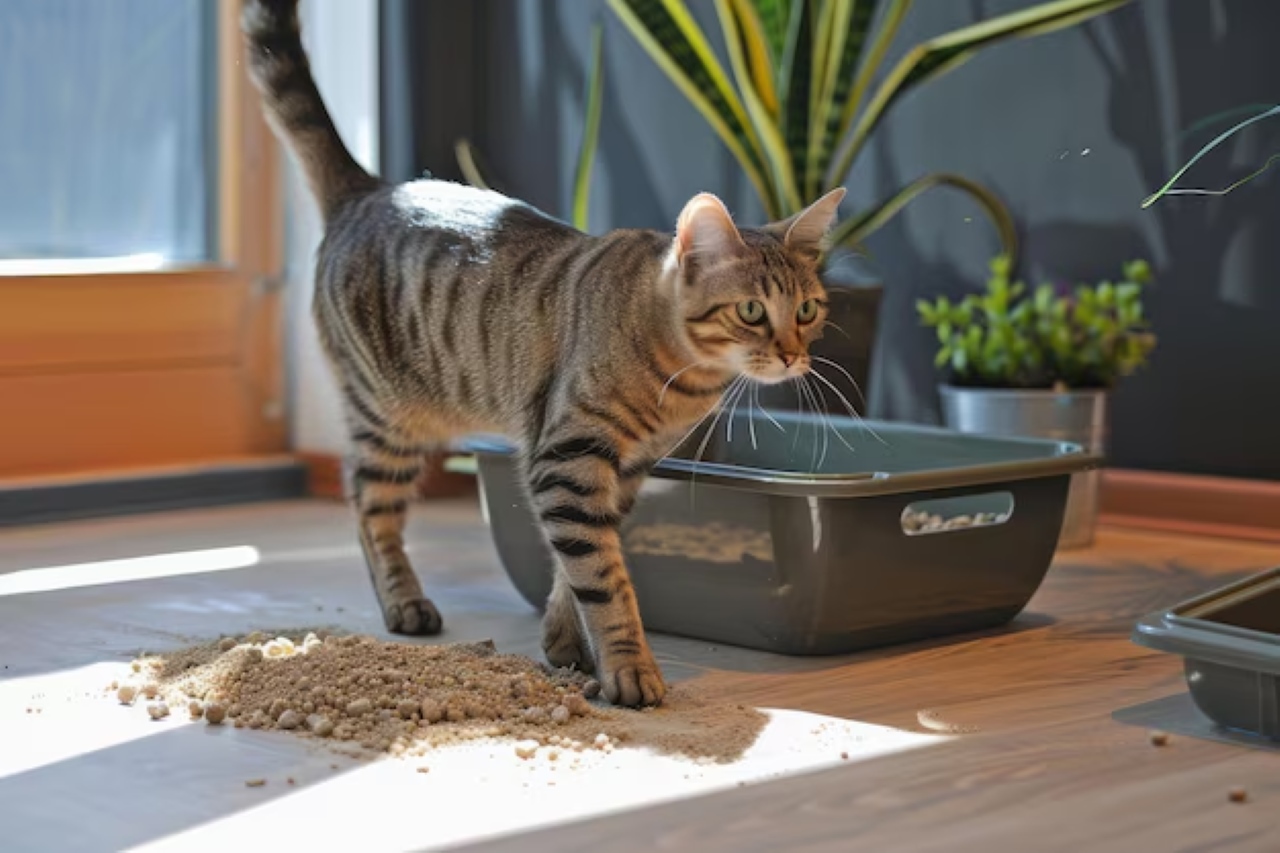
While a clean litter box is essential, its location can greatly impact your cat’s willingness to use it, even if the box itself is spotless. Litter box accessibility plays a vital role in your cat’s bathroom habits.
Cats prefer quiet, low-traffic areas for their toileting needs. If you’ve placed the litter box in a noisy or busy part of your home, your feline friend may opt for a quieter spot on the floor instead.
Consider your cat’s litter box preferences when choosing a location. Avoid placing it near food and water bowls, as cats instinctively separate their eating and elimination areas.
Additionally, make sure the box isn’t in a confined space where your cat might feel trapped or vulnerable.
Multi-story homes should have at least one litter box per floor to prevent accidents when your cat can’t reach their preferred box quickly.
If you’ve recently moved the litter box, your cat may be confused or stressed by the change. Gradually shift to the new location by moving the box a few inches each day.
Always provide easy access, especially for older or mobility-impaired cats, by avoiding stairs or high-sided boxes that are difficult to enter.
Environmental Changes
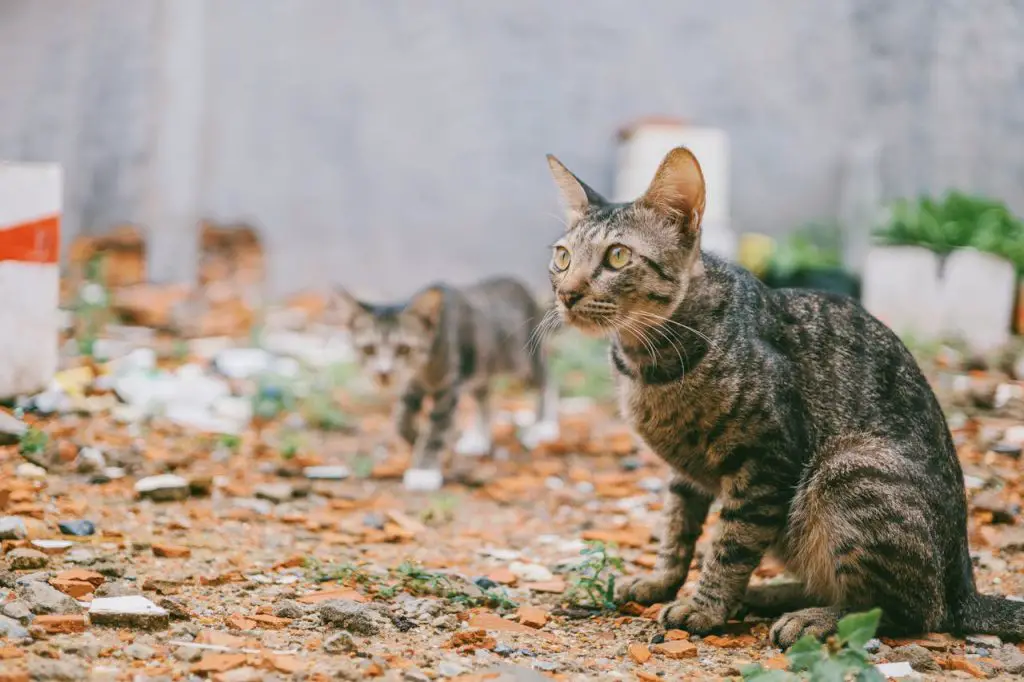
Changes in a cat’s environment can considerably impact its litter box habits, often leading to unwanted accidents on the floor. Environmental enrichment and routine changes play significant roles in your cat’s behavior.
When you introduce new elements or alter existing ones in your home, your feline friend may respond by avoiding its litter box.
Consider these common environmental changes that can affect your cat’s bathroom habits:
- Moving to a new home
- Rearranging furniture
- Introducing new pets or family members
- Changing the type or location of the litter box
These modifications can cause stress and anxiety in your cat, leading to inappropriate elimination. Cats are creatures of habit, and disruptions to their routine can manifest in undesirable behaviors.
To mitigate these issues, try to maintain consistency in your cat’s environment whenever possible. If changes are necessary, introduce them gradually.
Provide your cat with familiar items, such as its favorite bed or toys, to create a sense of security. Monitor your cat’s behavior closely during periods of change, and consult with your veterinarian if problems persist.
Training and Reinforcement
Proper training and positive reinforcement can greatly reduce the likelihood of your cat defecating outside its litter box, even in the face of environmental changes.
Consistent behavioral training is key to preventing or correcting this unwanted behavior.
Start by ensuring your cat associates the litter box with positive experiences. Place treats near the box or offer praise when your cat uses it correctly.
If you catch your cat in the act of pooping on the floor, avoid punishment. Instead, gently redirect it to the litter box.
Positive reinforcement techniques, such as clicker training, can be effective in teaching your cat to use the box consistently.
Reward your cat immediately after it uses the litter box to strengthen the connection between the desired behavior and the reward.
Consider your cat’s preferences when setting up the litter box. Some cats prefer open boxes, while others like covered ones. Experiment with different types of litter to find what your cat prefers.
Keep the box clean and easily accessible. If your cat continues to have issues, consult a veterinarian or animal behaviorist for specialized guidance in addressing this problem.
Frequent Questions and Answers
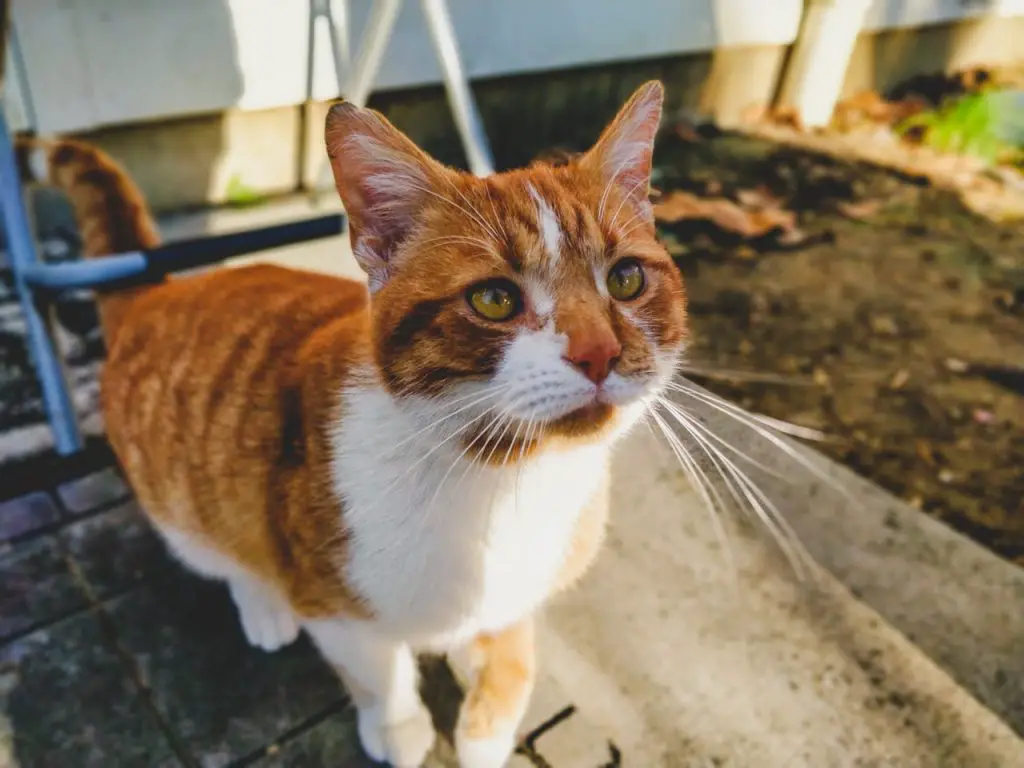
You might think diet changes are innocent, but they can indeed cause floor pooping. Dietary sensitivities and abrupt food shifts can upset your cat’s digestive system. This disruption may lead to inappropriate elimination as your cat adjusts to new foods.
Cats don’t poop on the floor out of spite. This behavior isn’t motivated by revenge. Instead, it’s often a sign of underlying issues like emotional stress or health problems. Understanding cat behavior is essential for addressing this issue effectively.
Is your feline friend’s indoor defecation a thorn in your side? You’ll need to provide consistent outdoor access and explore litter box alternatives. Establish a routine, use attractive substrates, and consider installing a cat flap for easy outdoor entry.
Yes, parasites can cause litter box issues in cats. You’ll notice parasite symptoms like diarrhea or discomfort, which may lead to avoidance. It’s essential to consult a vet for proper diagnosis and treatment of potential parasitic infections.
You’ll find that certain cat breeds may have distinct litter box habits. While breed tendencies can influence behavior, it’s not a definitive factor in inappropriate elimination. Environmental, health, and psychological factors often play more significant roles.
